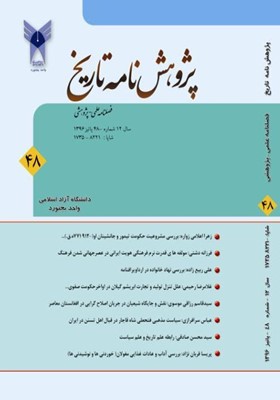سیاست مذهبی فتحعلی شاه قاجار در قبال اهل تسنن در ایران
محورهای موضوعی : باحث معرفتی و روش­ شناختی تاریخ پژوهیعباس سرافرازی 1 , محمد کاویانی یگانه 2
1 - دانشیار گروه تاریخ دانشگاه فردوسی مشهد
2 - کارشناس ارشد تاریخ ایران بعد از اسلام
کلید واژه: قاجاریه, سیاست مذهبی, کلیدواژهها: اهل تسنن, فتحعلی شاه قاجار,
چکیده مقاله :
منابع تاریخ قاجاریه تصویری متشرع از فتحعلی شاه، دومین پادشاه قاجار ترسیم نموده اند. حکومت وی بر بزرگترین مملکت شیعی جهان از یک سو و همجواری ایران با همسایگان پیرو مذهب سنت از سوی دیگر، شناخت سیاست مذهبی وی در قبال اهل تسنن را حائز اهمیت بسیار میسازد که هدف تحقیق پیش رو میباشد. بررسی منابع تاریخی نشان میدهد سیاست راهبردی سلاطین قاجاریه من جمله فتحعلی شاه در قبال اهل تسنن، سیاستی بر مبنای تقابل حداقلی، مدارای مذهبی و تلاش برای تحقق وحدت اسلامی بوده است که میتوان آنرا سیاست تعاملی نامید. مصادیقی چون آزادی مذهبی، امنیت اجتماعی، عدم وجود روایات دال بر درگیری نظامی حکومت با اهل تسنن، تلاش برای متمایل نمودن سنی مذهبان مناطق مرزی به حکومت مرکزی، نفوذ برخی علمای صوفی سنی در دربار و مراوده اهل سنت با درباریان و علمای شیعه موید این معناست. تاثیرپذیری احتمالی از روایات وارده از معصومین(ع) دال بر لزوم تعامل و تعایش شیعیان با عامه مسلمین، عدم احساس خطر سیاسی یا مذهبی از جانب اهل سنت، از میان رفتن تدریجی روحیه افراطی ضد تسنن در میان شیعیان، حاکم شدن دیدگاه مجتهدین و برچیده شدن تدریجی مشرب اخباری در میان علماء شیعه، جدی شدن خطر استعمار غرب و ضرورت اتحاد اسلامی و جلوگیری از متمایل شدن سنیان ساکن مناطق مرزی به مهاجرت یا پیوستن به همسایگان سنی مذهب رقیب دولت قاجاریه از مهمترین علل اتخاذ چنین سیاستی بوده است. روش تحقیق در این پژوهش، توصیفی- تحلیلی و روش گردآوری اطلاعات، کتابخانهای است.
The historical sources of Qajar era have made a devout image of Fathali Shah، the second Qajarid monarch. His rule over the world's largest Shia country on one hand and Iran's being neighbored by Sunni States on the other hand makes his religious policy towards the Sunnis of great importance which is the goal of this research. Historical sources show that the strategic policy of the Qajar kings including Fathali Shah towards the Sunnis is based on minimal confrontation، religious tolerance and attempting to realize Islamic unity which can be called "an interactive policy". Examples such as religious freedom، social security، the absence of narratives about military conflict with the Sunnis، trying to incline the Sunnis of marginal regions to the central government، the penetration of Sunni Sufi scholars into the royal court and the relations of the Sunnis with Shia statesmen and scholars support this idea. Possible influence of the Infallible Imams’ narrations urging the Shiites to coexist with the non-Shiites، absence of political or religious challenges from the Sunnis، the subsidence of radical anti-Sunnism among the Shiites، the prevail of the school of Mujtahidin and the gradual disappearance of Akhbari school among Shia scholars، the threat of Western colonialism and the necessity of Islamic alliance and preventing the Sunnis of marginal regions from immigrating or joining the rival Sunni neighbors of the Qajar government are the most important reasons of adopting such a policy. The research method is descriptive-analytical and the data gathering method is a desk study.
_||_


